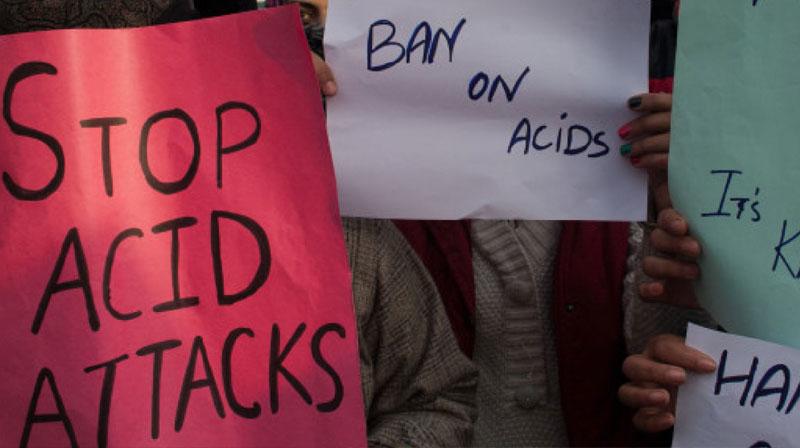Why India’s Stringent New Laws Have Not Reduced Acid Attacks

“People told my family to give me an injection that would kill me.”—Laxmi Agarwal, acid attack survivor.
Acid attack is one of the most heinous forms of violence, and women especially are its target. It is a worldwide problem, but most prevalent in South Asia. One of the most gruesome attacks was on Laxmi Agarwal, who was only 15 when a 32-year-old man threw acid on her for rejecting his advances. She fought back and ensured the perpetrator was put behind bars.
Laxmi’s case paved the way for India to frame specific laws against acid attacks. In 2014, Laxmi received the International Woman of Courage award from Michelle Obama, who was the first lady of the United States at the time. She was also named the NDTV Indian of the Year. The same year, she founded an NGO, Chhanv Foundation, to help survivors. A movie based on the story of her life is to be released soon.
WHAT IS AN ACID ATTACK?
Acid attack, also known as Vitriloage, is “a form of violent assault” defined as “the act of throwing acid intentionally on the body of another to disfigure, maim, torture or kill.” The offence can be called gender-based as 72% of victims are women. In 78% cases, the attack is due to rejection of marriage proposals or sexual advances, a marker of how prevalent male egoism, patriarchy and misogyny are in society.
Other triggers for acid attacks include vengefulness, jealousy and suspicion of infidelity.
In most cases, the perpetrator does not end up killing the victim, for the aim of an acid attack is to disfigure and inflict tremendous pain on the body and mind. The act of throwing acid changes a victim’s life irrevocably. The consequences range from permanent blindness to the dissolution of bones, ears and nose, apart from depression and anxiety. Many cases are not even reported because of the social stigma attached to an acid attack. The survivors also face adverse reactions from the world, such as ridicule.
THE LEGAL ANGLE
Until 2013, acid attacks were not recognised as a separate offence in India. The Supreme Court (SC) banned the sale of acids in retail stores for the first time in Laxmi v. Union of India. This was also the first case in which compensation was provided to the victim. The Indian Penal Code (IPC), through the Criminal Law (Amendment) Act 2013, provided for punishment for perpetrators of acid attacks. This amendment recognised acid attack as a separate offence and defined penalties for throwing or attempting to throw acid.
The amendments were passed on the recommendation of the Justice JS Verma Commission, which noted that acid violence is a “horrendous crime” which leaves the victim with no way of going back to their earlier way of life. The Commission also said that the offence should not be clubbed under the provisions of penalty for causing grievous hurt under the Indian Penal Code. Hence, section 326A was introduced in the IPC to deal with ‘voluntarily causing grievous hurt by use of acid...’. Any individual hit by this provision faces a minimum punishment of not less than ten years, which may extend to imprisonment for life and fine.
The 2013 amendment also introduced section 326B in the IPC, which makes voluntarily throwing or attempting to throw acid punishable with a minimum five-year sentence that may extend to seven years and a fine. Section 357B of the IPC provides for compensation, which is payable by the state government under Section 357-A, in addition to the payment of fine to the victim under section 326A.
Despite these legal changes, the number of acid attacks has not reduced in India. National Crime Records Bureau reported 222 acid attack cases in its Crime in India publication for 2015, 223 for 2016, and its latest report has put the number of reported cases of acid attack at 244. Even the number of attempts at acid attack have gone up, from 46 to 65, over the same period.
In Parivartan Kendra v. Union of India the SC has noted that the success of any law is determined by its implementation. It said that despite orders and directions of the same court in the Laxmi case, acid is still readily available to most of the population in India. In this landmark judgment, the SC directed state governments and Union Territories to “seriously discuss and take up the matter with all the private hospitals” so that they “should not refuse treatment to victims of acid attack and that full treatment should be provided to such victims including medicines, food, bedding and reconstructive surgeries.”
In 2017, the Prevention of Acid Attacks and Rehabilitation of Acid Attack Victims Bill was introduced to provide for steps to prevent acid attacks by regulating the sale, supply and use of acid, as well as other measures. It also proposed steps to rehabilitate victims and related matters. According to this bill no person shall be allowed to sell or deliver or transport acid without a proper record of their identity, the quantity of acid involved and the purpose for which it is to be used. It also provides for an increase in the maximum punishment for acid attacks under section 326B of the IPC to imprisonment for ten years.
In 2002, Bangladesh passed two separate laws to control acid attacks in that country.
One of the laws in Bangladesh makes the acid attacks that are particularly heinous punishable by death. The other law requires purchasers of acid to procure a license. Going by some accounts, these two laws have successfully brought acid violence down by 80%. However, such great results have not been seen in India yet. In 2017, 244 cases were reported across India. “Acid is still sold openly in some parts of India, and it is easily available to the offenders,” as Laxmi Agarwal has said.
Acid attacks are one of the growing crimes to harass the women in India and have become a tool in the hands of people who are out to destroy lives.
The growing incidence of acid attacks clearly indicates that India needs a clearer, more objective and stringent law against the perpetrators.
The current provisions of law do not take into account the various kinds of injuries that are inflicted by an acid attack. Second, the statute does not take into account the act of administering acid. Most importantly, it does not punish the intentional act of throwing acid if the victim suffers no injuries.
There is a need for effective implementation of existing provisions, along with the orders and guidelines of the SC, for acid is still easily available. Acid availability should be limited to commercial and scientific purposes, and information about the purchasers must be recorded in all cases.
Awareness about rights and remedies that are available in case an attack takes place also needs to be widespread. People must understand that a woman has the right to choose; this is especially important in the context of sexual offences such as rape and acid attack. Society, too, should help victims of this crime by accepting them instead of isolating and ostracising them.
The author is a student at National Law University, Jodhpur. The views are personal.
Get the latest reports & analysis with people's perspective on Protests, movements & deep analytical videos, discussions of the current affairs in your Telegram app. Subscribe to NewsClick's Telegram channel & get Real-Time updates on stories, as they get published on our website.
























